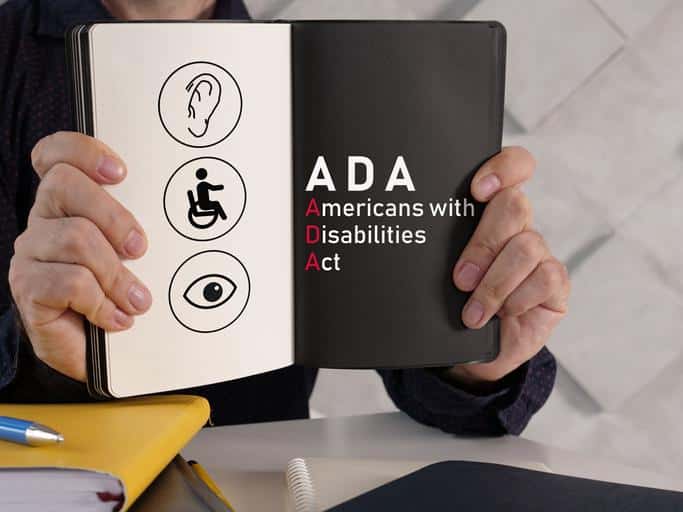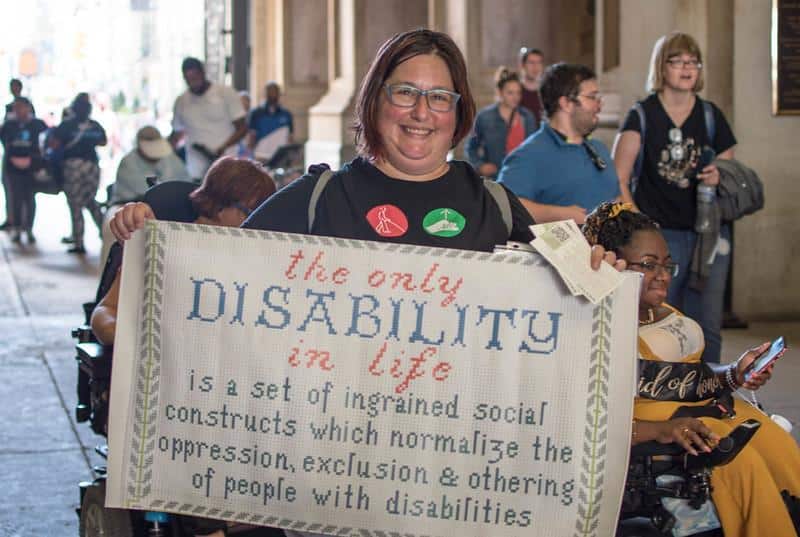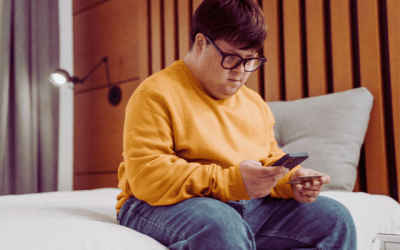It’s essential to know your rights as a person with intellectual and developmental disabilities (I/DD). Unfortunately, many people with I/DD may not know enough about their rights, which can lead to their rights being violated.
We will look at the ADA and Olmstead Decision and how they improve the rights and lives of people with I/DD. We will also touch on the HCBS Settings Rule and how Remote Supports helps empower the rights of people with I/DD to live more self-determined lives.
What is the ADA and the Olmstead Decision?

The Americans with Disabilities Act of 1990 (ADA) is a law that protects people with disabilities from being discriminated against in every aspect of life. The American Disability Act prevents discrimination against people with I/DD in private and public life. In addition, it helps people with I/DD have the same rights as people without disabilities, according to the ADA National Network in 2023.
The Olmstead Decision of 1999 took the Americans with Disabilities Act further, pushing for community living as a right for people with disabilities. The Olmstead decision by the US Supreme Court made community living a necessary part of services for people with I/DD. This reduced the segregation people with I/DD felt as more were offered homes in the community. They were also offered more person centered planning services for their needs, according to the HHS in 2018.
Before ADA and the Olmstead Decision, people with I/DD were excluded from mainstream society. For example, your right was most likely denied if you wanted to access the same educational opportunities, access housing like non-disabled people, or access public spaces. This was due to most people with I/DD being housed in institutions, which were often overcrowded, neglectful, and in some cases, abusive.
The ADA and Olmstead Decision gives people with I/DD far more rights and opportunities. If you want to access higher learning, you can. Employers need to provide reasonable accommodations for you in the workplace. You can also access public places and facilities that were not accessible before. The Olmstead Decision ensures you aren’t institutionalized. Instead, you can live in the community with privacy, independence, and freedom.
What is ADA Compliant?
ADA-compliant is when a service or facility follows the mandates talked about in the ADA. For example, certain support services, such as a remote supports service, have policies that help people with I/DD live more independently. This can be through the use of assistive technology and a privacy-first approach.
For example, if a person wanted to walk alone, they could use assistive technology in the form of a Geocomm. If they become lost or need help at any point, a simple click of a button would put them in touch with Remote Support. With the person’s permission, the staff could then turn on the Geocomm’s location and help guide the person home.
What is HCBS and How Does it Affect Support Services?
Home and community-based services (HCBS) are person-centered services that focus on people with I/DD, their goals, and their rights. HCBS helps people who need assistance with basic things, such as getting dressed or going outside. HCBS also empowers people with I/DD to live independently in a home instead of an institutional facility.
Before the HCBS Settings Rule, people with I/DD often had very little choice in their day-to-day life. That means if you wanted to maintain a relationship or had a goal that required you to go out into the community, you likely would not be allowed to, or someone else would decide for you.
Also Read: How HCBS Rules Protect the Rights of Disabled People
What Do You Do If Your Rights are Violated?
If you think your rights have been violated, the best thing to do is talk with your case manager. Give your case manager, service provider, or disability rights organization as much information as possible, and see how they can help you.
You can also take matters into your own hands and advocate for change. Advocators help spread awareness to improve services for people with I/DD.
How Do You Advocate for Yourself?
The best way to advocate for yourself is to know your rights. Learn about the ADA and Olmstead Decision, the HCBS Setting Rule (3), and how they give and protect your rights.
To advocate for your rights, you must be brave and speak up about any right you think is being violated. Reach out to your support circle, family members, and case managers, and tell them what’s on your mind. You can also consider contacting an advocacy organization focusing on the rights of people with I/DD.
Advocacy organizations play a crucial role in promoting the rights and well-being of individuals with intellectual and developmental disabilities (I/DD). These organizations work to ensure that people with I/DD have access to the same opportunities and resources as others and that their voices are heard and respected.
Remember, Remote Supports is available 24/7 and has a highly trained, friendly staff to provide support.
Summary
The ADA and Olmstead Decision are important laws passed that give rights to people with I/DD. Moving from institutionalized care to community-based care, people with I/DD are empowered to live like those without disabilities. In addition, with the HCBS Setting Rule, people with I/DD have more rights and opportunities to live however they want.

Knowing your rights can help you understand when and if your rights are being violated. This allows you to take action to protect your rights and stay empowered.




